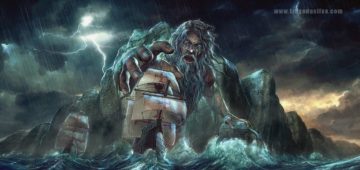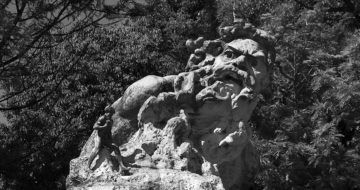by Charlie Huenemann

Vasco da Gama was the first person we can name who successfully commandeered a voyage around Africa’s southernmost point, the Cape of Good Hope. It is a treacherous passage, where warm currents from the southern part of the Indian Ocean clash against the icy currents of the south Atlantic, leading to dangerous waves that have swallowed many ships. (Indeed, at the time it was known as “the Cape of Storms”.) Da Gama gave the cape wide berth, sailing far the sight of land, before turning northward and poking his way along the eastern coast of Africa, where many hijinks ensued.
This was in 1497, and Europeans were keen to find some route to Indian spices that didn’t involve crossing lands controlled by some sultan or other. Da Gama showed everyone the way, and the Dutch and the English rushed through and established colonies along the coasts of the Indian Ocean. Da Gama’s fellow Portuguese established colonies as well, of course, but not with equal success. Part of the reason was that Portuguese sailors as a whole were not very interested in following da Gama’s Cape Route because they knew damned well there was a monster down there that ate ships like snacks.
Sailors spend their lives and meet their deaths in the middle of huge and violent systems they don’t understand and can’t control (well now, who doesn’t?) and so they make up stories to pretend to make sense of them. Unsurprisingly, many of these stories feature ill-tempered monsters with gaping mouths. The nautical disasters clustered around the Cape of Good Hope was pretty clear evidence of some beastly demon, and in 1572 the great Portuguese epic poet Luís de Camões gave the dreadful beast a name: Adamastor.
His haggard beard flow’d quiv’ring on the wind,
Revenge and horror in his mien combin’d;
His clouded front, by with’ring lightnings scar’d,
The inward anguish of his soul declar’d.
His red eyes, glowing from their dusky caves,
Shot livid fires: far echoing o’er the waves
His voice resounded, as the cavern’d shore
With hollow groan repeats the tempest’s roar.
(from The Lusiad, as englished by William Julius Mickle in 1877)
In Camões’ telling, it is de Gama who quiets Adamastor and convinces him to let ships safely pass, which was perhaps meant as encouragement to the reader; but the Portuguese sailors probably kept to their opinion that angry sea monsters do not make nice so readily. The Portuguese based their empire instead on Atlantic shores.

Adamstor has appeared subsequently in many poems and stories, and in Lisbon there is a statue of him in a lovely square overlooking the Tagus river called the Miradouro de Santa Catarina. It is on this small square that Ricardo Reis rented a room in 1936, and this further fact requires a bit more explanation.
Ricardo Reis is one of the heteronyms of Fernando Pessoa, the walking caravan of souls, the vehicle whose occupancy was always greater than and less than one. The stars of his ongoing variety show included Alberto Caeiro, Álvaro de Campos, Ricardo Reis, Bernardo Soares and Fernando Pessoa (appearing as himself). Reis was one of the heteronyms for whom Pessoa did not assign a date of death. So the brilliant Portuguese author José Saramago, in a warm homage to Pessoa, told the rest of Reis’s story in his novel, The Year of the Death of Ricardo Reis (1984).
As Pessoa tells us, Reis was a medical doctor with a background as a Latin teacher who emigrated from Lisbon to Brazil in 1919. His poems follow a tightly focused classical style, with a stoic’s acceptance of fate, and an occasional expression of mild love for a woman named Lydia. Saramago continues Reis’s biography by having him return to Lisbon in 1935 after learning of Pessoa’s death. He hooks up with a real Lydia (wait, what does ‘real’ mean here?), and rents an apartment overlooking the Miradouro de Santa Catarina, the Tagus, and the statue of Adamastor. The book’s most entertaining episodes are the conversations between Reis and the ghost of Pessoa. Their relationship falls somewhere between friends and father/son, and the conversations have the same playful give and take of all of Saramago’s fluid, unbroken dialogues.
Ricardo Reis went to the kitchen to get some coffee, returned to the study, sat opposite Fernando Pessoa, and said, It always feels strange not being able to offer you a cup of coffee. Pour another cup and put it in front of me, I’ll keep you company while you drink. I cannot get used to the idea that you do not exist. Seven months have passed already, enough time to engender a life, but you know more about that than I do, you are a doctor. Is there some veiled hint in that last remark. What veiled hint should I make. I’m not sure. You are touchy today. Perhaps it’s this business of removing statues, this proof of how fickle human loyalties can be, the Discus Thrower is another example. What discus thrower, The one on the Avenida, Now I remember, that naked youth pretending to be Greek, Well, he too has been removed. But why. They said he looked effeminate, they spoke of moral health and protecting the eyes of the city’s inhabitants from shameful displays of nudity. If the youth was not exaggerated in any of his physical proportions, what harm was he doing. Those so-called proportions, although neither exaggerated nor excessive, were more than sufficient to illustrate certain details of the male anatomy. But I thought they said the youth looked effeminate, is that not what they said. Yes. Then surely he offended because he was found wanting, not because there was too much of him. I am only repeating as best I can the rumors circulating in the city. My dear Reis, are the Portuguese gradually taking leave of their senses. If you who lived here ask this question, how can a man who lived abroad for so many years be expected to answer it.
The people in Reis’s world are most certainly taking leave of their senses, as the Spanish Civil War heats up and European fascists begin their boil. As much as Reis tries to find his place in the world, he can’t. He cannot commit to Lydia, he cannot take a side in politics, and he cannot find motivation to start his own medical practice. He floats above it all, perhaps as a good stoic should. But whether or not he attaches himself to anything, the events of the world will play out, and Fate will have its way. (The Portuguese are big on Fate.)
I will go ahead and give away the end of the book, which has Reis following Pessoa to the grave:
On the sidewalk opposite the park, they watched the pale lights flicker on the river, the ominous shadows of the mountains. Let’s go then, said Fernando Pessoa. Let’s go, agreed Ricardo Reis. Adamastor did not turn around to look, perhaps afraid that if he did, he might let out finally his mighty howl. Here, where the sea ends and the earth awaits.
I am enchanted by the mood, but I don’t understand why Adamastor would have howled, had he turned around to look. Perhaps the world that is coming at the end of the book is the death of all sea monsters, replaced as they will be by monstrosities of our own making. Perhaps Saramago himself could not bear to see the end of this curious friendship. Or perhaps, as the sailors know, no one faces the certainty of death without a mighty howl.
